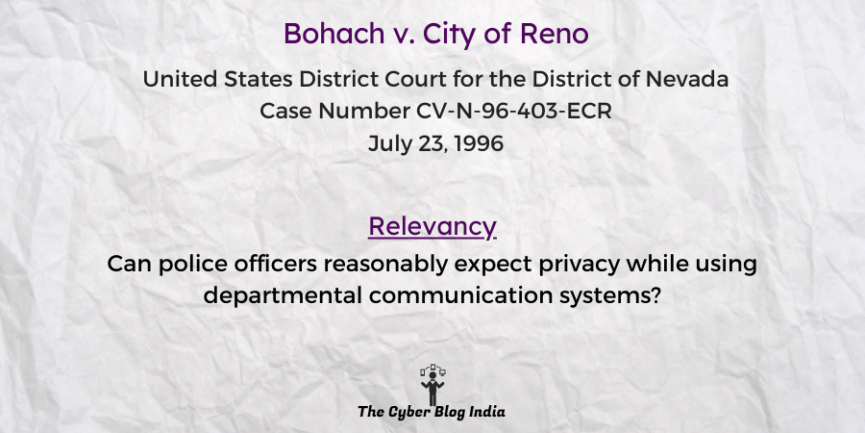Bohach v. City of Reno

Bohach v. City of Reno
932 F.Supp. 1232
In the United States District Court for the District of Nevada
Case Number CV-N-96-403-ECR
Before District Judge E.C. Reed, Jr.
Decided on July 23, 1996
Relevancy of the Case: Can police officers reasonably expect privacy while using departmental communication systems?
Statutes and Provisions Involved
- The Omnibus Crime Control and Safe Streets Act, 18 U.S.C. §§ 2510-2511
Relevant Facts of the Case
- Alphapage is a software program installed on the Reno Police Department’s local area network.
- A 1994 standing order by the Police Department Chief informed all the users that the network logs every message sent through the Alphapage network.
- The Internal Affairs investigation relied on the messages Bohach and Catalano sent to each other and one other department member.
- The plaintiffs, Bohach and Catalano, claim violation of their constitutional right to privacy and federal wiretapping statutes due to the Department’s storage of their messages and subsequent retrieval.
Prominent Arguments by the Counsels
- The plaintiff’s counsel objected to the passage of their messages through the computer as it stored, recorded, or downloaded their contents.
- The defendant’s counsel contended that the City provides the electronic communications service. Hence, neither it nor its employees can be liable under Section 2701.
Opinion of the Bench
- The plaintiffs can succeed in their Fourth Amendment claim only if they claim that they have a reasonable expectation of privacy. However, law enforcement agencies regularly record incoming and outgoing calls for various reasons.
- When using a system like Alphapage, one should expect less privacy than one might expect.
- The plaintiffs have not established that they had an objectively reasonable expectation of privacy.
- Even if the interception were to occur, the court would likely find implied consent in the light of the plaintiffs’ intention to send those messages after the 1994 standing order.
Final Decision
- The court denied the plaintiff’s motions.
